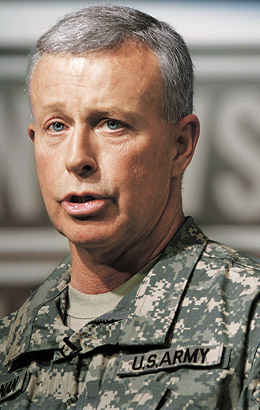
Dave McKiernan helped NATO win in Kosovo with smart thinking and a willingness to bring unpleasant news to his superiors. He's going to need both of those attributes in spades as he tries to steer the U.S. and its allies now engaged in the oozing wound that is the war along the Afghanistan-Pakistan border. McKiernan, 58, held three positions in the Army under my command starting in the early 1990s. I watched him bring the 1st Brigade of the 1st Cavalry Division back into peak form after the first Gulf War. He's extraordinarily calm under stress, a clear thinker, tough and morally courageous.
He didn't hesitate to tell President Obama that he needed more troops in Afghanistan, and won an additional 21,000 troops to aid more than 35,000 already there. Despite the popular mind-set that generals always want more, at the highest levels there are constraints — political, military, financial — on what they can have, and asking for more is harder than it looks. McKiernan is not afraid to stand up and ask for what he needs.
When you have troops under you who are dying in combat, as he now does, the conflict carries an even heavier emotional weight. Dave has to work with U.S. forces and allies to strengthen our military response. He has to keep the Afghan people on his side — being sure to order air strikes judiciously, only when there's simply no other way of attacking a high-value target — but he's also got to watch out for the young soldiers and Marines in the fight. It's a delicate balancing act, but McKiernan is up to the task: making sure we don't get forced off the battlefield before the political and diplomatic strategies unfolding in the region take hold.
Clark, a retired general, is a former NATO commander